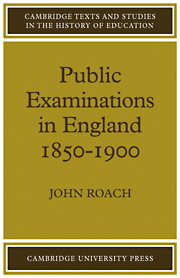Book contents
- Frontmatter
- Contents
- Dedication
- Preface
- List of abbreviations
- PART I THE COMPETITIVE PRINCIPLE ESTABLISHED
- PART II THE OXFORD AND CAMBRIDGE LOCALS AND NATIONAL EDUCATION, 1857–1900
- PART III THE PUBLIC CONTEXT, 1855–1900
- 8 The Civil Service Examinations: to 1870
- 9 The Civil Service Examinations: after 1870
- 10 School Examinations – from Taunton to Bryce
- 11 Critics and criticisms
- Bibliography
- Index
9 - The Civil Service Examinations: after 1870
Published online by Cambridge University Press: 07 October 2011
- Frontmatter
- Contents
- Dedication
- Preface
- List of abbreviations
- PART I THE COMPETITIVE PRINCIPLE ESTABLISHED
- PART II THE OXFORD AND CAMBRIDGE LOCALS AND NATIONAL EDUCATION, 1857–1900
- PART III THE PUBLIC CONTEXT, 1855–1900
- 8 The Civil Service Examinations: to 1870
- 9 The Civil Service Examinations: after 1870
- 10 School Examinations – from Taunton to Bryce
- 11 Critics and criticisms
- Bibliography
- Index
Summary
Open competition was finally introduced by Gladstone in an Order-in-Council of 4 June 1870. The prime minister had been urged to take this step by his chancellor of the exchequer, Robert Lowe. Both of them were, of course, distinguished Oxford men, who had been concerned with the original reforms of the fifties. The victory of the reformers in 1870 was a triumph for the Civil Service Commissioners and for those who thought like them, but it marked merely a stage in a long story. It was one thing to adopt a principle. It was quite another to forecast how that principle would work out, for the development of the examinations was bound to be deeply influenced by the way in which the Civil Service itself developed. Two Royal Commissions, the Playfair Commission of 1874 and the Ridley Commission of 1886, were set up to study its organization and to recommend improvements. Under the old order there had hardly been a single service at all, but rather a congeries of departments with little definition of the different grades of responsibility in each office. These problems are deeprooted and intractable in all governmental structures. The Northcote–Trevelyan report had tried to deal with some of them. They have endured into the twentieth century to be the subject of the Fulton report of 1968. Indeed, as the sphere of government becomes wider, the structure of administration becomes more complex. This study is not a history of the Civil Service and no attempt will be made to examine these issues more fully here. But they have a profound influence on recruitment.
- Type
- Chapter
- Information
- Public Examinations in England 1850–1900 , pp. 210 - 228Publisher: Cambridge University PressPrint publication year: 1971
- 1
- Cited by



